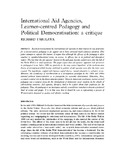| dc.contributor.author | Tabulawa, R. | |
| dc.date.accessioned | 2010-06-16T13:51:44Z | |
| dc.date.available | 2010-06-16T13:51:44Z | |
| dc.date.issued | 2003-02 | |
| dc.identifier.citation | Tabulawa, R. (2003) International Aid Agencies, learner-centred pedagogy and political democratisation: a critique, Comparative Education, Vol. 39, No.1, pp. 7-26 | en_US |
| dc.identifier.issn | 0305-0068 | |
| dc.identifier.uri | http://hdl.handle.net/10311/518 | |
| dc.description.abstract | Recent pronouncements by international aid agencies on their interest in and preference
for a learner-centred pedagogy so far appear not to have attracted much scholarly attention. This
paper attempts to explain this interest. It argues that although the efficacy of the pedagogy is often
couched in cognitive/educational terms, in essence, its efficacy lies in its political and ideological
nature. The fact that the aid agencies’ interest in the pedagogy became explicit soon after the fall of
the Berlin Wall is in itself significant. The paper argues that aid agencies’ apparent lack of interest
in pedagogical issues before 1989 lay partially in the very central hypothesis of the modernisation
theory of development which became enshrined in policies of aid agencies soon after the latter were
created. The hypothesis, coupled with human capital theory, viewed education in technicist terms.
However, the ascendancy of neo-liberalism as a development paradigm in the 1980s and 1990s
elevated political democratisation as a prerequisite for economic development. Education, then,
assumed a central role in the democratisation project. Given its democratic tendencies, learner-centred
pedagogy was a natural choice for the development of democratic social relations in the schools of
aid-receiving countries. Aid agencies, therefore, had to be explicit about their preference for the
pedagogy. Thus, the pedagogy is an ideological outlook, a worldview intended to develop a preferred
kind of society and people. It is in this sense that it should be seen as representing a process of
Westernisation disguised as quality and effective teaching. | en_US |
| dc.language.iso | en | en_US |
| dc.publisher | Routledge. http://www.informaworld.com | en_US |
| dc.subject | Education | en_US |
| dc.subject | International agencies | en_US |
| dc.subject | Developing Countries | en_US |
| dc.title | International Aid Agencies, learner-centred pedagogy and political democratisation: a critique | en_US |
| dc.type | Published Article | en_US |

